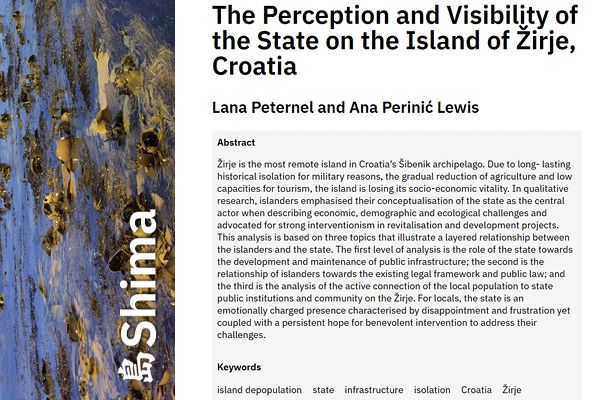Notifications list
The Perception and Visibility of the State on the Island of Žirje, Croatia
Published: 12.02.2025.

“We don’t say isolation – we say paradise” is a quote by which Lana Peternel, PhD and Ana Perinić Lewis, PhD (Institute for Migration Research) begin their description of everyday lives of residents of the small Island of Žirje in the Šibenik archipelago.
Their scientific paper “The Perception and Visibility of the State on the Island of Žirje, Croatia”, from which the quote is cited, is published in Shima – a journal indexed in the Scopus data base (Q1 for History and Q2 for Cultural Studies, 2023). Interestingly, the journal’s title is derived from a Japanese term that is most often translated into English as “island.” Nevertheless, the journal also refers thematically to other types of spaces that are regarded as insular by the communities inhabiting them. The research is financed by the Croatian Science Foundation within the project “Isolated people and communities in Slovenia and Croatia” (ISOLATION IPS-2022-02-3741).
Abstract: Žirje is the most remote island in Croatia’s Šibenik archipelago. Due to long-lasting historical isolation for military reasons, the gradual reduction of agriculture and low capacities for tourism, the island is losing its socio-economic vitality. In the qualitative research, islanders emphasised their conceptualisation of the state as the central actor when describing economic, demographic and ecological challenges and advocated for strong interventionism in revitalisation and development projects. This analysis is based on three topics that illustrate a layered relationship between the islanders and the state. The first level of analysis is the role of the state towards the development and maintenance of public infrastructure; the second is the relationship of islanders towards the existing legal framework and public law; and the third is the analysis of the active connection of the local population to state public institutions and community on the Žirje. For locals, the state is an emotionally charged presence characterised by disappointment and frustration yet coupled with a persistent hope for benevolent intervention to address their challenges.
The paper is available at the following link.
